

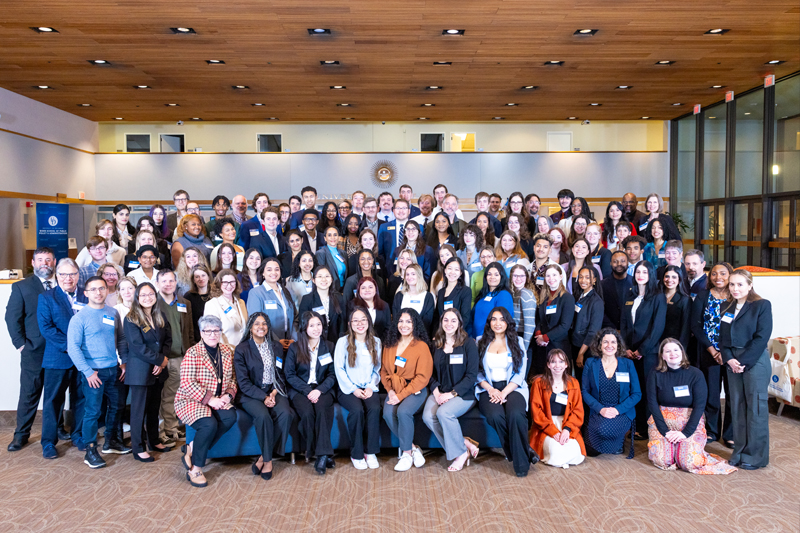
Advancing civil discourse on college campuses
Photos by Maria Errico April 16, 2024
Students and faculty from across the country gather at UD Biden School for SNF Ithaca National Student Dialogue
The Stavros Niarchos Foundation (SNF) Ithaca Initiative in the Joseph R. Biden, Jr. School of Public Policy and Administration at the University of Delaware welcomed over 100 students, faculty and staff from across the United States for its third annual SNF Ithaca National Student Dialogue from March 22–24 on the Newark campus.
From Friday to Sunday, the weekend-long event took attendees through case study presentations, panel discussions and various breakout sessions that included combined and separate tracks for faculty and students. The balance of structured and less structured sessions allowed for productive activity while leaving space for organic moments of connection.
The 2024 program featured a new workshop session specially for faculty called “Teaching Democracy in the Classroom,” which kicked off the weekend with faculty and doctoral students from both of SNF Ithaca’s sister programs, Johns Hopkins University’s SNF Agora Institute and the University of Pennsylvania’s SNF Paideia Program. Students from each of these programs attended the SNF Ithaca National Student Dialogue. This year also featured an open invitation for UD students to join in on the learning and connection opportunities.
Centering around the timely theme of “free expression and the inclusive community,” each agenda item was grounded in the higher education climate of the present-day and recent months. How do free speech and inclusivity intersect? How can they co-exist on college campuses? Is it appropriate to frame these democratic principles as conflicting with one another?
A fraught challenge
Six decades after the Civil Rights Movement took the nation by storm and the concept of free speech burst into the public consciousness via college campuses, the collective group gathered on Saturday at Clayton Hall was quickly reminded of how full circle things feel today and the risks at hand, albeit with some shifts around those speaking up regarding freedom of speech.
“We need not look far to see national civil discourse rapidly deteriorating. Amid political violence, amid rampant conspiracy theories and polarization, the world is looking to us — to each one of you — to engage in the preservation of our democracy,” said Biden School interim dean Joseph Trainor as he addressed the crowd.
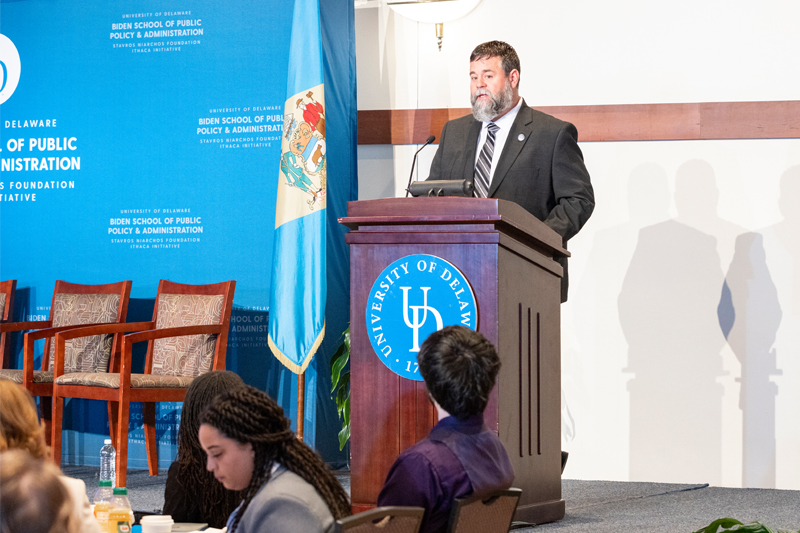
As he set the stage for the weekend’s event, Trainor recounted President Joe Biden, and the simple directive he shared with faculty and staff upon the school’s naming in 2018: “Help students learn how to talk to each other again. Help them to engage in dialogue across difference. Help them to bridge the divide.”
This year’s dialogue saw 30 academic institutions in attendance, from historically Black colleges and universities (HBCUs) to regional public universities, religiously based liberal arts colleges, research universities and community colleges. Such a diverse pool of institutions and people created the ideal foundation for an event like this.
“This weekend, you’re going to engage fellow students from across the country and around the world who have different lived experiences, different identities and different political ideologies,” Trainor said. “Despite those differences, you’ll struggle together to consider a fraught challenge facing college campuses everywhere: the struggle between free expression and inclusion. Striking the balance between protecting free speech and fostering inclusivity requires a willingness to engage with others in search of common ground, in search of approaches that respect both of these critical values of our democracy.”
What is civil discourse, exactly?
When gathering such a mix of people, disagreement and tension are unavoidable. How those differences are navigated between the individuals at play is crucial, said Timothy J. Shaffer, Stavros Niarchos Foundation (SNF) Chair of Civil Discourse and SNF Ithaca Director.
“Disagreement is not a reason to stop talking to one another,” he said.
Just like opposing viewpoints, the concept of civil discourse is multi-layered. But Shaffer believes it’s easily defined when applied to scenarios like the SNF Ithaca National Student Dialogue.
“Civil discourse will be understood as a tool that can help navigate difficult conversations while maintaining and strengthening democratic values,” he said, noting that approaching it as a “collaborative and relational process to engage with others and co-create meaning” is key.
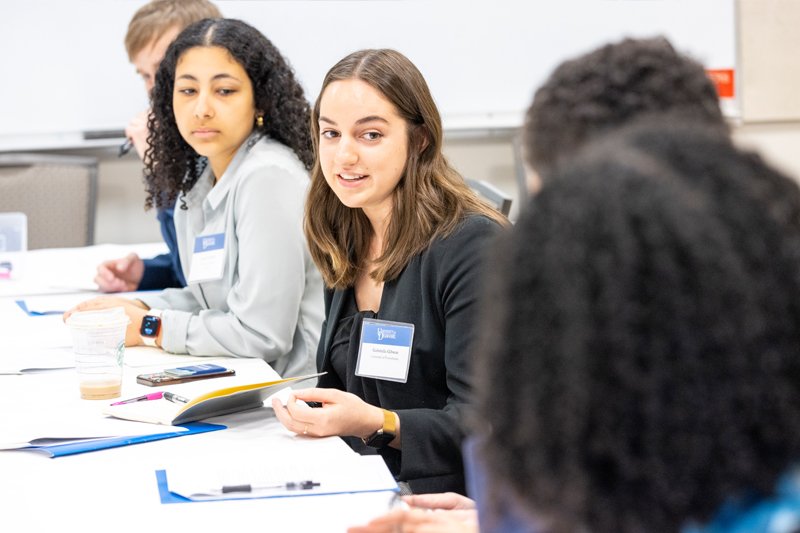
While this concept extends far beyond the confines of a college campus, the higher education setting and target audience are fitting for many reasons.
“Colleges and universities have diverse populations from various backgrounds, cultures and beliefs,” Shaffer said. “[They] also have their own explicit or implicit cultures, norms and values. These may reflect broader societal norms or challenge them, providing opportunities to explore and critique cultural beliefs and practices.
“Whether we are thinking about society more broadly or our campuses more narrowly, being able to understand and address our common issues requires us to engage in dialogue to inform policy or collective actions,” he added.
The SNF Ithaca Initiative at UD, now in its third year, was named after the home of Odysseus — one of Greek mythology's greatest heroes, whose talent for persuasive discourse was revered in the world’s first democracy. For Odysseus, Ithaca represents not only the beginning of a journey but the ultimate destination. Likewise, the SNF Ithaca Initiative serves as both the beginning of the Biden School students' journey toward becoming engaged and effective citizens and as the ultimate destination for students across the country to come together and work in partnership to develop policy solutions.
“Being able to talk across divides, to approach every interaction with curiosity rather than defensiveness, to recognize the inherent humanity of others even while vigorously defending deeply held values, these are some of the most essential skills young people can learn,” said Casey Russo, Programs Co-Director at SNF. “The National Student Dialogue and SNF Ithaca more broadly are helping young citizens gain skills that are essential to a healthy democracy.”
Holding space for nuance
The importance of nuance, context and language were major conversation points during the weekend, weaving together the various sessions on Saturday and Sunday. The SNF Ithaca Student Leaders, a cohort of five UD undergraduate students selected to serve in their roles for the academic year, presented their case study, “Navigating the Intersection of Free Expression and Diversity, Equity, and Inclusion on College Campuses.”
Using the fall 2023 resignation of the former University of Pennsylvania president Liz Magill and the events that preceded and followed, the session covered the history of free speech on campus, its current state and its future.
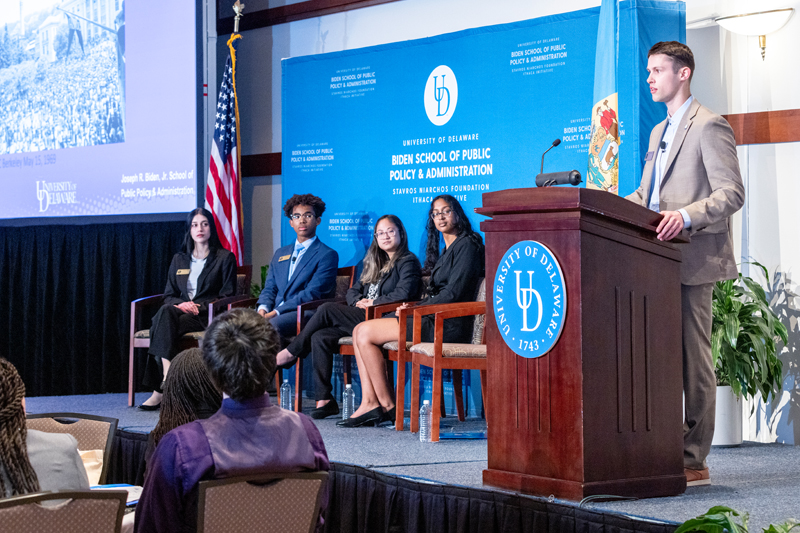
Mya Trujillo, a student at Howard University who attended this year’s dialogue, feels passionately about connecting with others on important, “hot button” issues like free speech, no matter how intimidating they may seem on paper.
“It was truly inspiring to see so many fellow students eager to spark change in their communities,” she said. “While the discussions we had were constructive, they merely scratched the surface of the iceberg that is free speech and inclusivity in this country. These kinds of events serve as the foundational building blocks toward creating spaces for productive discourse across polarized groups. While the dialogue’s attendees weren’t polarized, they were able to identify some root causes of the dysfunctional discourse that takes place in today’s political climate.”
Colleges and universities are unique ecosystems built on nuance, with various factors and actors constantly at play. Recognizing those layers while engaging in civil discourse helps build upon ideas and bring opposite viewpoints together instead of aiming to tear each other apart.
“Facts are really important, but they don’t speak for themselves,” Shaffer recently told the Chronicle of Higher Education. “They have to be understood and interpreted. If we can help create space for that to be part of the conversation, I think we’re better for it.”
Culture of conversation
The importance of context was a prominent topic during the faculty panel discussion, “Competing or Complementary Democratic Principles in Higher Education,” featuring Lori Britt of James Madison University, SNF Ithaca Affiliated Faculty member Jennifer Lambe, Nicholas V. Longo of Providence College and UD Vice President for Student Life José-Luis Riera.
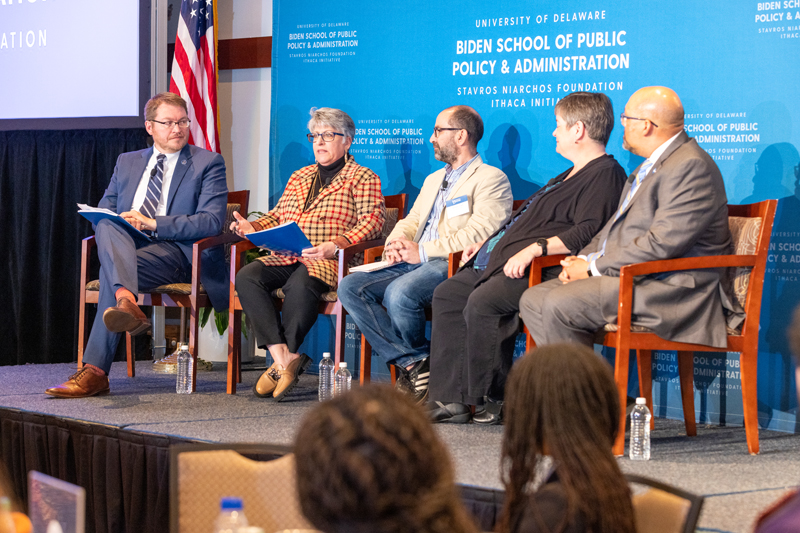
Lambe, who specializes in First Amendment rights and serves as an associate professor with the Department of Communication in the UD College of Arts and Sciences, quickly pointed out that “universities are just not one context.”
From residence halls to board rooms, there are countless elements and subgroups of people in orbit, sometimes with campus communities of tens of thousands to consider.
Britt said it’s about fostering a “culture of conversation” in these environments.
Simon Brand, one of the SNF Ithaca Student Leaders, saw these topics at play throughout the weekend.
“As a facilitator, I led sessions delving into the core issues that, though unique to each participant's campus, resonated universally. Recognizing both the similarities and distinctive challenges faced by our colleges shed light on the best strategies to foster civil discourse,” he said.
Impact across state lines
As the weekend came to a close, student attendees, in particular, were energized by their learnings and ready to take these new tools back to their respective campuses.
“Since being here, my idea around [civic engagement] has really evolved and I feel like something is taking root as I’m listening to my peers and the faculty and the staff talk about what this actually means,” said Sunrise Smith of Holyoke Community College in Massachusetts.
Implementing civil discourse training at first-year student orientation is what Deriana Brown plans to pitch upon her return to the University of San Francisco.
“I think that would be a great start to your college journey. Learning to discuss respectfully is definitely a skill that you need to take with you throughout your college journey and beyond,” she said.
Fostering proactive communities of dialogue is what William Thompson hopes to bring back with him to the University of Virginia.
“One of the things that really stood out to me was the idea of making dialogue part of the culture of campus proactively, not just in a reactive way when issues pop up when we feel a need to respond to things,” he said. “The idea that we’re regularly bringing people together sometimes just to talk and exercise those muscles and develop them for when we do have to face issues that really do matter.”
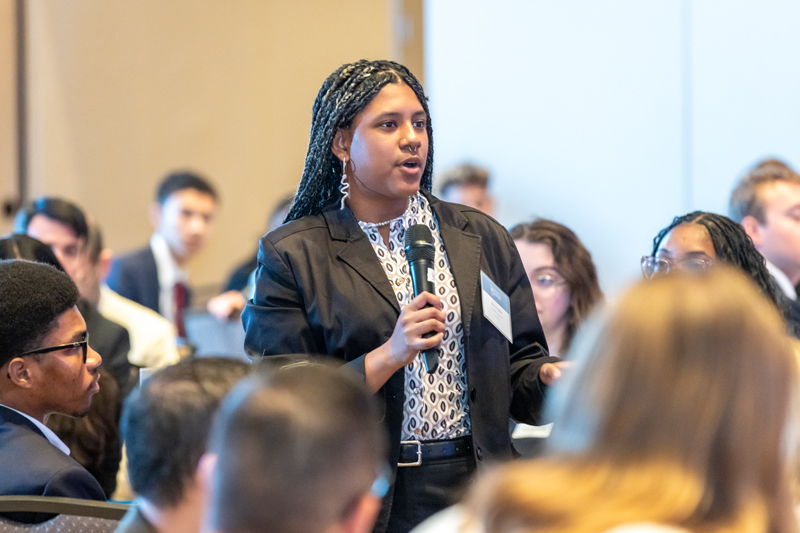
In these student takeaways, the words of educator and activist Myles Horton certainly rang true: “One of the best ways of educating people is to give them an experience that embodies what you are trying to teach. When you believe in a democratic society, you provide a setting for education that is democratic.”
To learn more about the Biden School’s SNF Ithaca Initiative and its work to unite college students in the spirit of civil civic engagement, visit bidenschool.udel.edu/snfithaca.
About the UD Biden School
Established in 1961 and named in 2018 for the University of Delaware’s most distinguished alumnus, the 46th President of the United States, the Joseph R. Biden, Jr. School of Public Policy and Administration prepares students with the knowledge and skills necessary to engage in research and public service activities to improve the quality of life in communities around the world. The Biden School’s faculty, staff, students, and alumni create and use interdisciplinary, nonpartisan research, and empirically based analysis to inform effective decision-making and policy and to improve leadership and administration. The Biden School partners with organizations from all sectors to discover innovative and equitable solutions to the critical challenges of our time.
About the SNF Ithaca Initiative
SNF Ithaca, an initiative of the University of Delaware's Joseph R. Biden, Jr. School of Public Policy & Administration, seeks to advance democracy by equipping students with the civil discourse and civic engagement skills necessary to navigate the mediated public square. Supported by the Stavros Niarchos Foundation (SNF), SNF Ithaca is named after the home of Odysseus—one of Greek mythology's greatest heroes. For Odysseus, Ithaca represents not only the beginning of a journey but the ultimate destination. Likewise, the SNF Ithaca Initiative serves as both the beginning of the Biden School students' journey toward becoming engaged and effective citizens and as the ultimate destination for students across the country to come together and develop the civil civic engagement skills that will strengthen our democracy.
Contact Us
Have a UDaily story idea?
Contact us at ocm@udel.edu
Members of the press
Contact us at 302-831-NEWS or visit the Media Relations website

